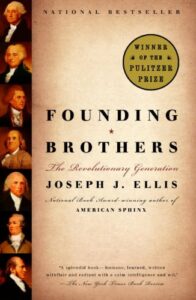 I am, admittedly, late to the party in reading this one since it was published in 2000. Joseph Ellis is a well-known historian and author and this book won the Pulitzer Prize, so I’m not going to spend time critiquing it, apart from one little nit. The term “propitious moment” is used no less than seven times throughout the book. I know I could have found a few different ways to phrase that. Just sayin’.
I am, admittedly, late to the party in reading this one since it was published in 2000. Joseph Ellis is a well-known historian and author and this book won the Pulitzer Prize, so I’m not going to spend time critiquing it, apart from one little nit. The term “propitious moment” is used no less than seven times throughout the book. I know I could have found a few different ways to phrase that. Just sayin’.
This book seemed like a good source of inspiration since revolution is a central focus of my book (and its still-to-be-written sequel). I thought it might be good to hear some first-hand accounts of what the “revolutionary generation,” as Ellis calls them, had to say about the events of 1776 and beyond, and this book did not disappoint. Thomas Jefferson and John Adams are central figures, of course, with one entire chapter devoted just to their voluminous correspondence. But Alexander Hamilton is featured prominently as well. By an interesting coincidence, I happened to be reading chapters 1 and 2 (entitled “The Duel” and “The Dinner” respectively) during the same time I was finishing my first pass through the soundtrack to the Broadway musical Hamilton. As I mentioned previously, I’m no fan of Hamilton the man, but the musical is growing on me. In particular, I think my favorite song is The Room Where It Happens which is a jazzy and convivial account of the secret dinner between Jefferson, Hamilton, and James Madison where the Compromise of 1790 was negotiated. Chapter 2 dives into this bargain in detail and highlights that secret meetings and back-room deals are in no way a new development in American politics. It has always fascinated me that an individual or a handful of individuals can be responsible for decisions that have long-term effects on millions of people that they will never know or meet. This has always seemed to me an obvious flaw in so-called representative government.
The author does not weigh in personally on any of the philosophical debates of the time, but he does a good job of conveying the feelings of those contemporaries with strongly-held beliefs and the often catastrophic results of them acting (or not acting) upon them. In the case of Adams and Jefferson, the political game left them committed adversaries after they both left the White House and it took decades for them to repair their once deep friendship. Ellis does a superb job in the book’s final chapter of portraying the gradual thawing of relations between these two giants of the American pantheon. Definitely a inspiring read, whether you are researching for a novel or not.

